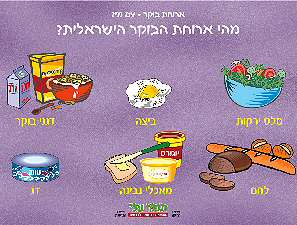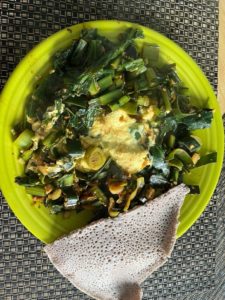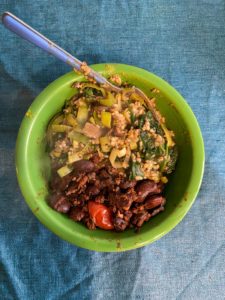Breakfast is a touchy subject. It appears that even folks who are ready to experiment with lunch and dinner don’t want to confront something strange and unfamiliar when they get up.
While my breakfast preferences have changed over the years, there are still items that surprise me when I travel or stay with friends. The Large American Brunch, for example, completely threw me off when I came to Berkeley. Fried potatoes? And toast? And meat? For breakfast? I couldn’t believe people would want to eat that (even if it’s served at a good diner, rather than in an abominable Egg McMuffin). My roommate from Taiwan enjoyed a big plate of pork and fried greens at 7am, which was delicious for her and very odd for me. And, when scheduled to give talks in England, Oxford and London hotels insisted on serving fried tomatoes (why spoil a good thing?) and mushrooms, and beans. All these choices apparently work perfectly well for folks who are used to them, but me – I couldn’t cope with those items.
My usual morning fare includes a cup of hot water with lemon, followed by fresh fruit; I find it works really well for me and gives me a nice start. But when going out or inviting people in, we often eat the traditional Israeli breakfast, comprised of the following items:
– eggs
– cheese of various kinds
– a big vegetable salad
– bread
– tuna or some smoked fish (optional)
– orange or grapefruit juice
– coffee or tea
Now, Israeli hotels are quite famous for their breakfasts, which include a variety of additional items: fruit, yoghurt, various muesli, granola and cereal options, hot cake, salty and sweet pastries, etc. Even less exciting venues often add good quality tchina. But the egg, cheese and salad are the key components.
What’s so good about an Israel breakfast? Obviously, considering that most people eat bread in the morning with their eggs and cheese, it offers a combination of carbs and protein. Count the juice in, and you’ve got some more sugar and vitamins. If one is into food combinations, the best and safest way to enjoy this is to focus on the eggs, cheese and vegetables.
Thinking about this, the Israeli breakfast is not less strange than other breakfasts. Its appeal to Israelis is in its familiarity, and to tourists – in its novelty. Most people are not used to raw vegetables on their morning plates.





3 Comments
While I look for all different foods during the day, it’s in breakfast that my English-heritage can be seen – toast, cereal, yoghurt, fruit maybe baked beans or an egg, but that’s about it.
I was horrified when I first went to the US and was given meat and pancakes together on a plate. My breakfast conservatism meant I just couldn’t manage to eat anything that strange for the first meal of the day.
Hi, Kathryn! I felt exactly the same place (meat OR pancakes would somehow make more sense than the two of them, side by side). It’s kind of interesting how we find it hard to face unfamiliar stuff in the mornings, isn’t it?
Thanks for visiting!
I am surprised that there is so many proteins in 1 meal? Raw fruits/vegetables good choice plus a carb such as cereal or bread and beverage is SO much healthier. Linda